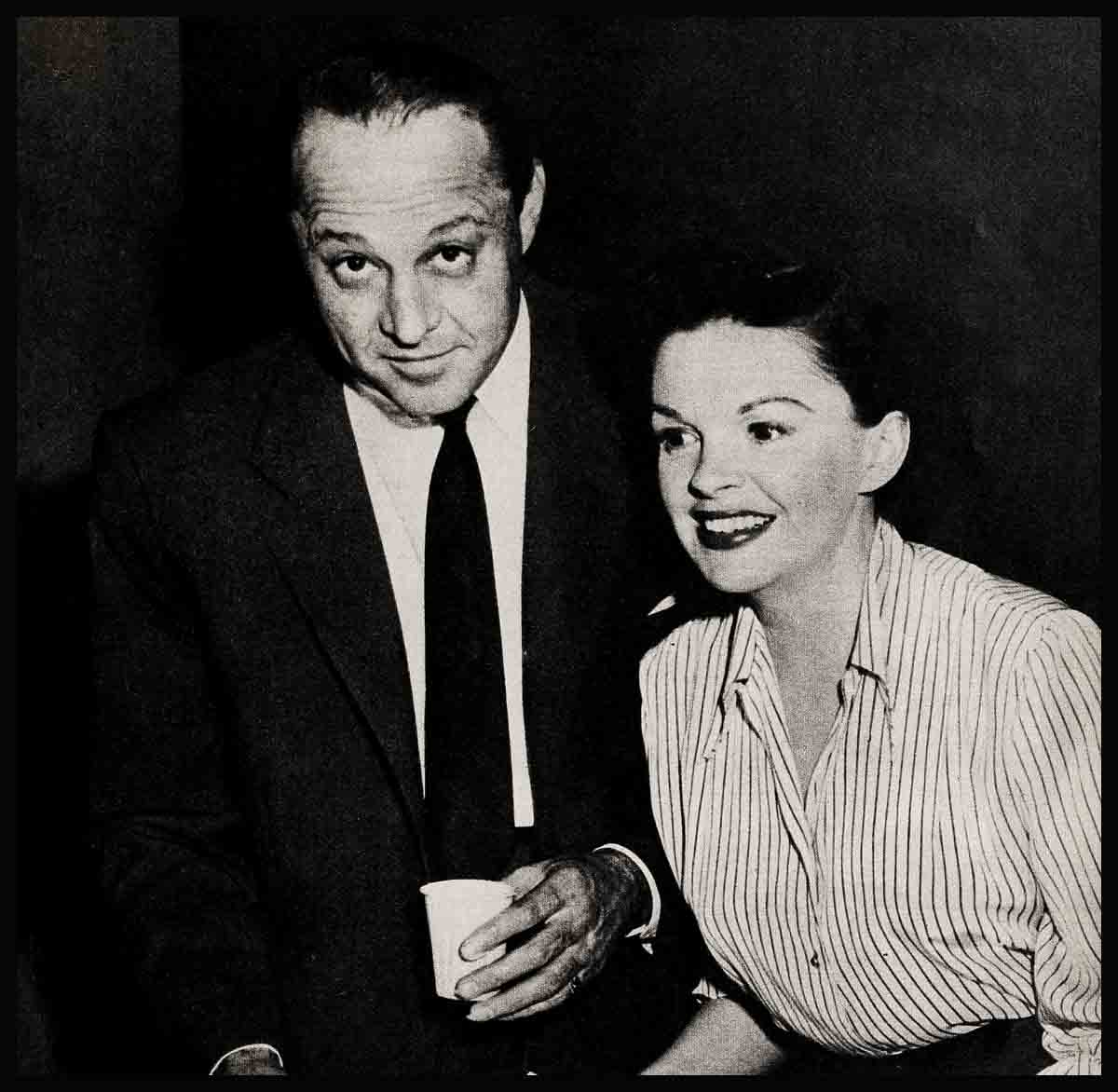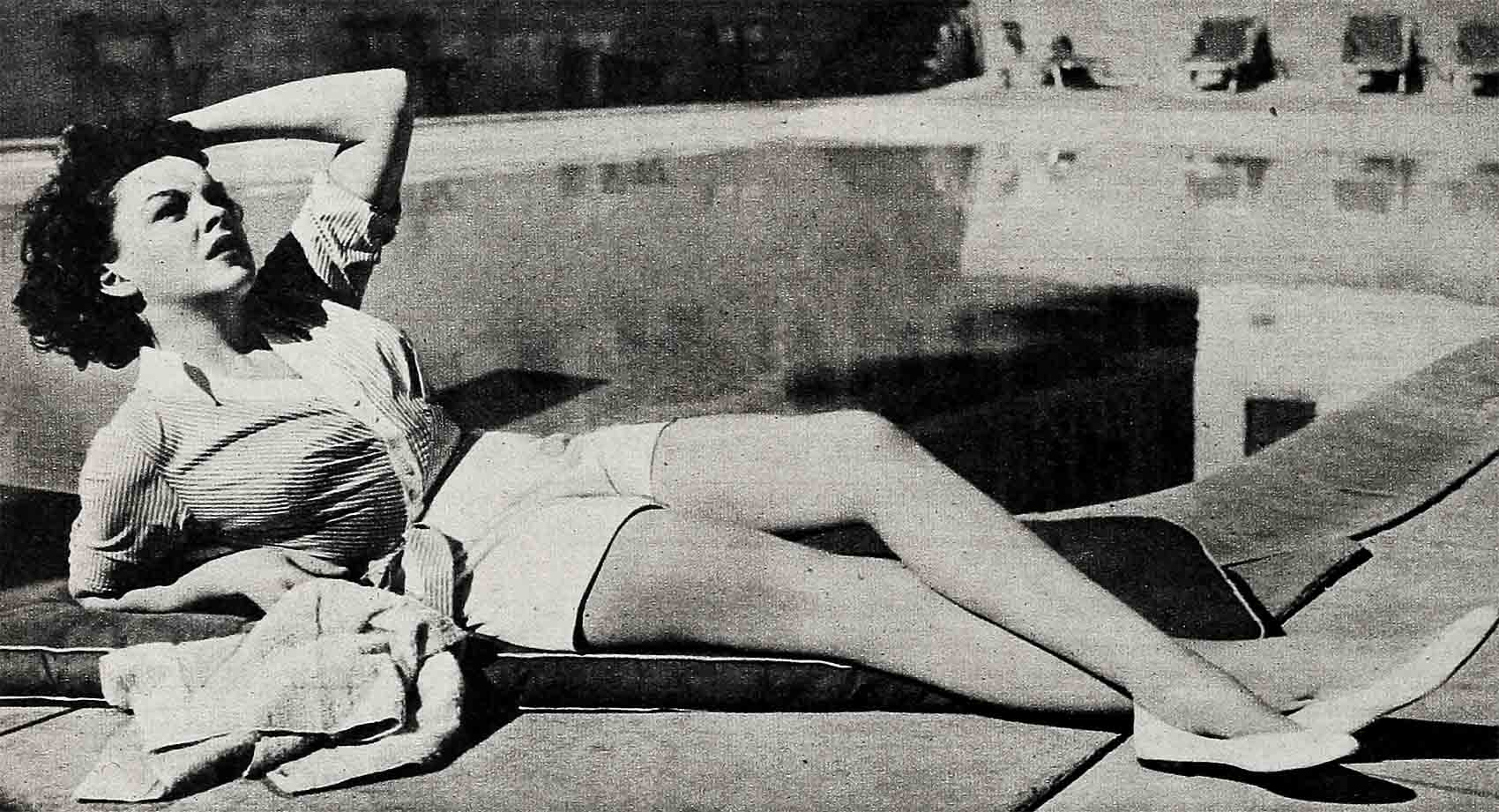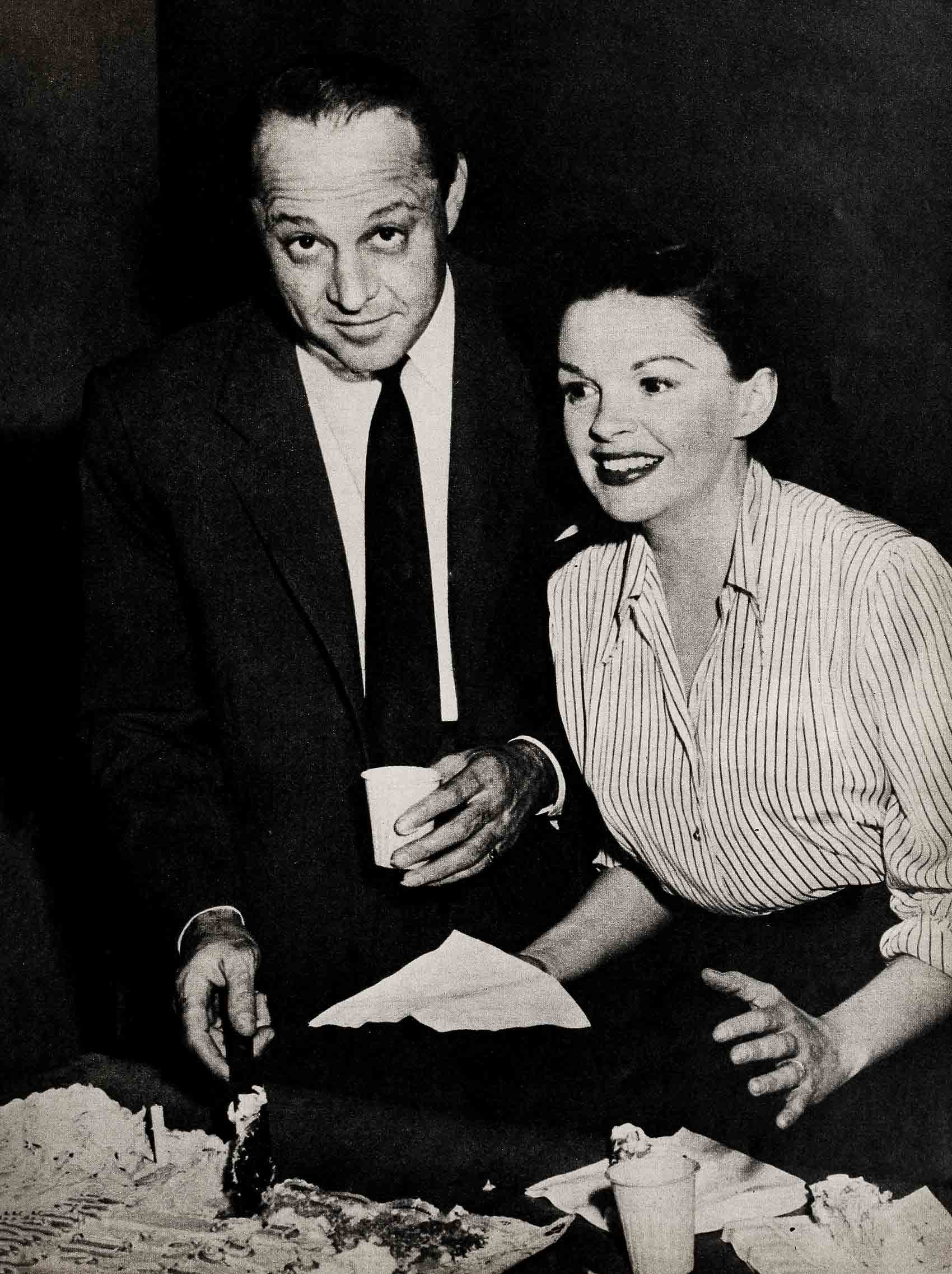
Poor But Happy—Judy Garland
Judy Garland’s third husband, Sid Luft, strode into the California Superior Court several weeks ago. He was present to answer charges filed by his former wife, Lynn Bari.
Lynn wanted to know why Sid had violated a court order. He had failed to set up a $10,000 insurance fund for his son John as he had previously promised.
“Your Honor,” Sid said. “I just don’t have the money. In fact we’re living on $30,000 I’ve borrowed.”
The judge listened attentively as Sid described his depleted finances.
Presently he said, “I see no point in sending this man to jail. He’s paying for the support of his son each month. I’m satisfied that when his financial condition improves he will meet his obligations.”
When Hollywood read that Sid was broke, that he had borrowed $30,000 to support Judy and the children, it shook its collective head.
“Poor Judy,” one friend mumbled. “Out of the frying pan, into the fire.”
“And to think,” another offered, “that Judy is pregnant, too. The baby’s scheduled for the first week in April.”
There were sighs and sobs, condolences and contributions. But one young woman carried on brightly and undismayed in face of the situation. That was thirty-two-year-old Judy Garland herself.
Judy, as you probably know, is nervous and temperamental. When the news about Sid hit the headlines, people expected hysterics of her. Instead Judy was unruffled.
“I tell you,” she says, “when I’m pregnant, I’m completely happy. No matter what, I feel wonderful. I sit and eat. I never worry about my weight. I’m really relaxed.
“When I’m not pregnant and I have to worry about my diet, I get terribly nervous. Dieting is tough for me. It’s always been tough. But after this baby comes, you have my word. I’ll get down to 110 pounds and stay there.”
Not a word about her financial condition. Not a word about the fact that Judy threw most of her hard-earned money into A Star Is Born. Not a word to indicate that Star might prove to be a financial loss.
Judy is looking at the world through rose-colored glasses. At the Academy Awards nominations dinner, she sighed a little when Star was not even nominated for the best film production of the year. But she was thrilled to her very toes when she won a nomination for the best performance by an actress.

“How do you feel about it?” she asked.
“I feel great,” she asserted. “But I really think Grace Kelly will win the Oscar. Did you see Country Girl? Wasn’t she just wonderful in it?”
“She was great, but most people seem to think you’ll win. Your performance in Star was magnificent.”
“I hope so,” Judy said. use it.” “I sure could use it.”
By the time you read this, the twenty-seventh Academy Awards will have been announced. If Judy has won, there will be great rejoicing in her home. If not, there will be great rejoicing anyway, because her third child will have been delivered via Caesarean section on April 8. Either way, July will be a winner.
“If it’s a boy,” she told me, “we’ll call him Josh. If it’s a girl, well name her Tina. Sid and I will love any child that comes along. Sid’s son John plays with our two girls around here, so the way I figure it, we’ve already got one boy in this family, anyway.”
In some Hollywood quarters, it’s been suggested that if Judy doesn’t win the Oscar, she might never make another movie.
“I can’t tell you,” one of her associates confides, “how much of her life and energy and money she put into A Star Is Born. It took almost a year, $6,000,000, five different cameramen, three different camera processes, and an endless list of struggles.
“Judy is a perfectionist, and in this business perfection costs money. In addition she knew that her husband’s career as a producer was riding on the picture, too. That’s why she gave it everything she had. She made a lot of retakes while she was pregnant. And it’s lucky that her pregnancies are easy. No morning sickness.
“If she doesn’t win an Oscar, I’m convinced that she’ll be so discouraged that it’ll be another five years before she tries another film.”
This associate was asked what Judy would do for money if she made no more films.
“First of all, Judy has been offered scads of dough to star in a television series. Sid was back in New York kicking the deal around with NBC. No doubt he’d be the producer of such a series. So long as Judy can sing, there’s no money problem. That’s why she doesn’t worry about it.
“My own opinion is that all she’ll get out of Star is her house. She bought it from Hunt Stromberg and had it completely remodeled. I guess it cost her $200,000. The dark wood walls have been bleached to a lighter shade. The bathrooms have been completely redone. Walls have been added and subtracted. It’s a beautiful place right across the street from Lana Turner’s. Judy loves it.”
Judy is very much in love with her husband. Although the wise guys said the marriage would last about ninety days, it seems to be more secure than ever. The reason for this is Judy’s boundless faith in Sid.
“I can’t tell you how bright he is,” she maintains. “He’s a wonderful father, a considerate husband. And he understands me perfectly. He’s just right for me. He beats in my own particular rhythm. We’re what you might call very well mated.

“I know when we started Star lots of people around here said, ‘What does he know about picture making?’ Well, Sid showed them. He knows a lot, and I’ll tell you this. I don’t think I’d ever make another picture or do any sort of show without him to guide me. He’s a swell guy and I’ll always listen to him.”
These are the words of a young woman who has finally found herself, a young woman with hidden resources of inner strength. Judy is a girl who was counted out five years ago. They said she’d never make it again, never return to stardom.
She fooled them, and she attributes her comeback largely to her husband’s faith.
“Sid kept telling me,” she says, “that my career wasn’t over, that it had just begun. He was so right. He took me through the dark times, and I’ll never forget that.”
What brought on the dark times, anyway? Judy, understandably, dislikes looking back. What she went through, all the horror and sadness, is something she blocks out.
The answer probably is love, unhappy love. That was the villian in her youth. She fell in love with David Rose, the composer. Dave was twelve years older than Judy. She hadn’t known many boys before him. One was Barron Polan, a youngster assigned by Leland Hayward to squire Judy to parties and other Hollywood functions. When Dave proposed marriage, Judy, all of nineteen, quickly accepted.
The marriage was doomed from the beginning. It was difficult to tell who was more temperamental, Dave or Judy.
Then came Vincente Minnelli, the artistic MGM director who had guided Judy in Meet Me In St. Louis. This marriage was blessed by the birth of Liza, now nine. But not even Liza could save it. Mentally and physically exhausted, Judy started taking sleeping pills. She thought this might be the answer to overwork, too much weight, her squabbles with the studio, her falling out of love with Vincente. It was the answer to nothing. It led to despair and estrangement from her mother. It led to a nervous collapse.
When Sid Luft moved into Judy’s life, the typical movieland reaction was that the brown-eyed little singer was all washed up.
No one expected Sid, former private secretary to Eleanor Powell, a pilot, a race track entrepreneur and a former husband of Lynn Bari’s, to revive in Judy the will to entertain.
The power of love should never be underestimated. With Sid to guide her, Judy made her comeback in London, then New York, then Los Angeles.
It must be said here that the funds for the comeback were supplied in part by the William Morris Agency, Abe Lastfogel directing. Neither Lastfogel nor William Morris represents Judy today.
In June of 1952 Sid and Judy were married. Then Lorna was born. Simultaneously, Sid began working on a comeback vehicle for his wife.
He wanted to remake A Star Is Born into a musical. But David Selznick who had made the original production had already sold the film to television. In fact it was being telecast every Tuesday and Thursday. A producer named Edward Alperson had the rights.
Luft went to see Alperson. They formed a partnership, Transcona Corporation, and the film was pulled out of TV. A release deal was made with Warner Brothers and playwright Moss Hart was hired to do the new screenplay.
There is no point in rehashing all the trouble that accrued to this production. Suffice it to say that Judy proved to everyone that she has what it takes.
“I know,” she says, “that I’ve been blamed for all the production delays on Star. I know people said the picture took almost a year to make because of me. Let them make me the heavy, but the truth is there were a lot of factors that slowed down the production.
“CinemaScope was pretty new at the time. In fact we scrapped a month’s film before we even started to shoot in CinemaScope.”
But in time, A Star Is Born was finished and pregnancy notwithstanding, Judy, many months ago, went on the road to help sell it. The picture cost so much that it very likely never will make any considerable profit. The foreign returns probably will tell the story.
There is no doubt, however, that it is a great picture. Once and for all, Judy proved to the doubting Thomases that she can sing and act superbly, that if anything, her talents have multiplied. She was so great in Star that she doesn’t know how to follow it.
Rodgers and Hammerstein have suggested that she play the Mary Martin role in the film version of South Pacific. But in Judy’s words, “I really don’t know what I’m going to do after the baby comes. That is, about my career. Sid and I are going to be very careful. We’re certainly not going to rush into anything.”
Right now, however, Judy is more interested in childbirth than any other subject. If she produces a son, friends jokingly suggest that she name him Oscar.
The chances are very good, however, that by the time she meets the stork, Judy will have already won an Oscar. Certainly she deserves one, not only for an incomparably memorable performance, but for courage and determination.
Win or lose, Judy Garland has won back the public.
THE END
—BY JIM NEWTON
It is a quote. MODERN SCREEN MAGAZINE MAY 1955




